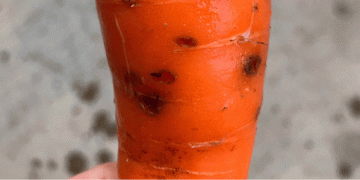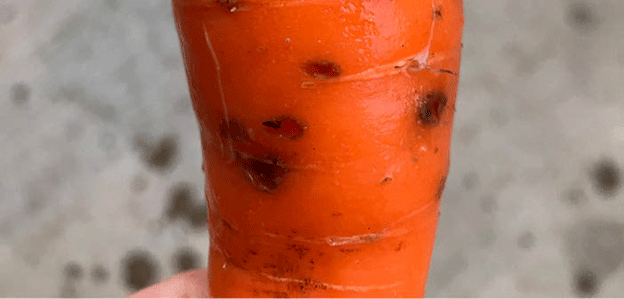Cavity spot, caused by soil-borne Pythium species (P. violae and P. sulcatum), remains one of the most destructive diseases in carrot production. It not only affects yield but also leads to significant rejection rates at market. According to the UK’s Agriculture and Horticulture Development Board (AHDB), 15–20% of carrot crops can be rejected by buyers due to cavity spot lesions, resulting in substantial financial losses for growers.
But promising new results from trials by Richard Austin Agriculture, in collaboration with Orion, suggest that biostimulants may offer a viable and sustainable alternative to chemical fungicides — without compromising yield or crop quality.
Biostimulants in Focus: Sirius and Pluton
Two biostimulants were tested in the trials:
- Pluton: A liquid plant growth-promoting rhizobacteria (PGPR) product that supports root development and plant resilience.
- Sirius: A silicon-based biostimulant that improves nutrient uptake and helps strengthen plants, particularly increasing calcium accumulation in developing roots, which is crucial for cavity spot resistance.
When applied at:
- 0.5 liters per hectare (l/ha) at drilling,
- again at 1–2 true leaf, and
- at 3–4 true leaf stage,
this biostimulant combination matched and even slightly outperformed the conventional fungicide SL567A, which was applied at 1.3 l/ha at the 3–5 leaf stage.
Trial Results at a Glance
- Untreated plot yield: 4.24 kg
- Yield with SL567A fungicide: 5.23 kg
- Yield with Sirius + Pluton: 5.33 kg
- 96% of biostimulant-treated crops showed no signs of cavity spot
- Infection rate halved with biostimulant treatment compared to untreated controls
These results underscore the potential of biostimulants to both suppress disease and enhance productivity, even under pressure from wet growing conditions that typically exacerbate Pythium outbreaks.
Implications for Farmers and Agronomists
With increasing restrictions on fungicides in the EU and UK, and a rising need for sustainable crop protection, these findings offer real-world relevance for:
- Carrot producers seeking alternatives to synthetic inputs,
- Agronomists aiming to build integrated crop protection strategies,
- Scientists studying plant-microbe interactions and soil health,
- And farm owners looking to meet environmental compliance without yield penalties.
Biostimulants like Sirius and Pluton not only improve plant resilience to pathogens but also help optimize root zone health, contributing to broader soil vitality — a cornerstone of long-term sustainability.
As wet growing seasons intensify disease risks in carrot production, this trial confirms that biostimulants can be more than just an add-on — they are now proving to be a primary tool for cavity spot management. With comparable or better yields than fungicides and fewer regulatory constraints, biostimulants represent a powerful solution for the future of sustainable vegetable farming.































